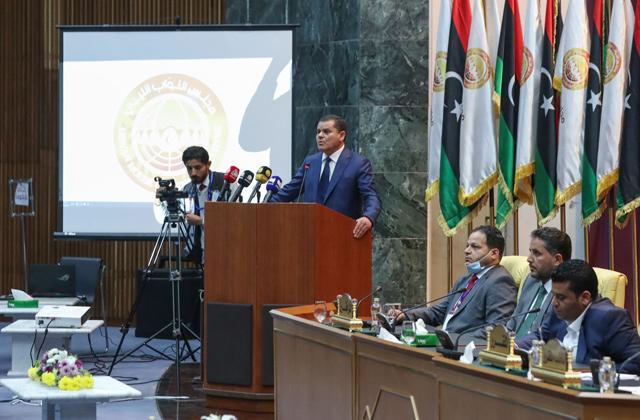- International News
- Web-2021-03-10 | 03:47 pm

Nayrouz News Agency :
Libya's prime minister-designate urged lawmakers Tuesday to back his new government to help end a grinding civil war, denouncing a campaign he claimed sought to "destroy" the fragmented North African nation.
Oil-rich Libya descended into chaos after leader Muammar Qadhafi was toppled and killed in a 2011 NATO-backed uprising, resulting in multiple forces vying for power.
"We have no choice but to come to an agreement, for the future of our children," interim premier Abdul Hamid Dbeibah said, to the applause of parliament, which is sitting in the central seaside city of Sirte.
A UN-supervised process aims to unite the country after an October ceasefire between forces loyal to two rival administrations, each backed by foreign powers, in the east and west of the country.
Dbeibah, who submitted his proposed government to parliament for approval last week, denounced a "fierce campaign" and a "plot" carried out by "those who want to destroy our country, who want to occupy it".
He did not elaborate, but the process has been marred by allegations of vote-buying.
Dbeibah was selected in February at UN-sponsored talks, attended by a cross section of Libyans, to steer the country towards December 24 polls.
‘For all Libyans’
The interim premier defended the composition of his proposed government.
"My first objective was to choose people with whom I would be able to work, no matter where they come from,” Dbeibah said.
The members of his government "must be able to work for all Libyans in all of Libya, not just for their region or their city”, he insisted.
Over 130 of a total 188 lawmakers began meeting on Monday in Sirte, Qadhafi’s hometown, to debate the proposed cabinet.
The Mediterranean port city lies halfway between Tripoli, where the UN-recognised government is based, and the east, where parliament has sat in recent years and which is home to a rival administration.
The UN mission in Libya called the meeting "historic” and praised the convening of a "reunified session after many years of divisions and paralysis”.
Dbeibah, 61, a billionaire businessman from the western town of Misrata, was selected alongside an interim three-member presidency council to head the new unity administration.
If approved, it would replace the Tripoli-based Government of National Accord headed by Fayez Al Sarraj, and the parallel eastern-based administration backed by strongman Khalifa Haftar.
The interim government will face the daunting challenge of addressing the many grievances of Libyans, from a dire economic crisis and soaring unemployment to crippling inflation and wretched public services.
Dbeibah’s proposed government includes two deputy prime ministers, 26 ministers and six ministers of state, with the key foreign and justice portfolios handed to women, a first in Libya.
He has until March 19 to win approval for his Cabinet.













